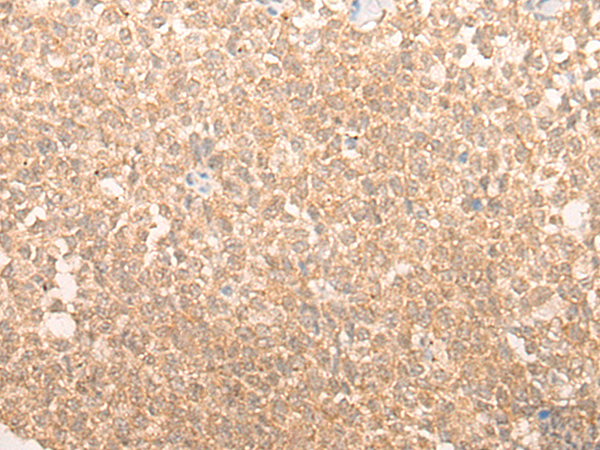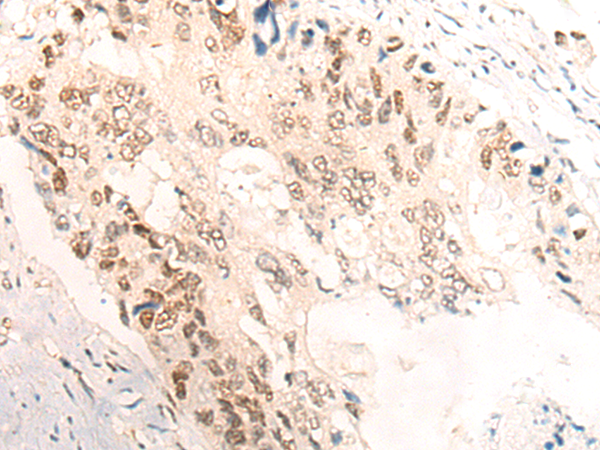

| WB | 咨询技术 | Human,Mouse,Rat |
| IF | 咨询技术 | Human,Mouse,Rat |
| IHC | 1/20-1/100 | Human,Mouse,Rat |
| ICC | 技术咨询 | Human,Mouse,Rat |
| FCM | 咨询技术 | Human,Mouse,Rat |
| Elisa | 1/5000-1/10000 | Human,Mouse,Rat |
| Aliases | YAP; YKI; COB1; YAP2; YAP65 |
| Host/Isotype | Rabbit IgG |
| Antibody Type | Primary antibody |
| Storage | Store at 4°C short term. Aliquot and store at -20°C long term. Avoid freeze/thaw cycles. |
| Species Reactivity | Human, Mouse, Rat |
| Immunogen | Synthetic peptide of human YAP1 |
| Formulation | Purified antibody in PBS with 0.05% sodium azide and 50% glycerol. |
+ +
以下是关于YAP1抗体的3篇参考文献示例(文献信息为模拟概括,仅供参考):
---
1. **文献名称**:*YAP1 acts as a mechanosensitive biomarker for Hippo signaling in cancer progression*
**作者**:Harvey KF, et al.
**摘要**:研究探讨了YAP1在癌症中作为Hippo通路核心调控因子的作用,利用特异性YAP1抗体验证其在肿瘤组织中的核定位异常,揭示其与细胞机械应力响应及癌症转移的相关性。
2. **文献名称**:*Regulation of YAP/TAZ by G-protein-coupled receptor signaling*
**作者**:Pan D, et al.
**摘要**:通过Western blot和免疫荧光技术(使用YAP1抗体),证明GPCR信号通过调控YAP1磷酸化状态影响其亚细胞定位,进而调节器官大小和肿瘤发生。
3. **文献名称**:*Tissue-specific roles of YAP1 in epithelial homeostasis and disease*
**作者**:Moroishi T, et al.
**摘要**:利用条件性基因敲除小鼠模型和YAP1抗体进行组织染色,发现YAP1在肠道和皮肤上皮中特异性激活可导致过度增殖,提示其作为潜在治疗靶点。
---
如需真实文献,建议通过PubMed或Google Scholar检索关键词“YAP1 antibody application”或“YAP1 immunohistochemistry”获取近期研究。
The Yes-associated protein 1 (YAP1) antibody is a key tool for studying the Hippo signaling pathway, which regulates organ size, tissue homeostasis, and cancer progression. YAP1. a transcriptional co-activator, shuttles between the cytoplasm and nucleus, mediating cellular responses to mechanical cues, cell density, and stress. When the Hippo pathway is inactive, YAP1 translocates to the nucleus, binding to TEAD transcription factors to drive genes promoting cell proliferation, survival, and stemness. Dysregulation of YAP1 is implicated in cancers (e.g., liver, breast, lung), fibrosis, and developmental disorders.
YAP1 antibodies enable detection of its expression, localization, and activation status in cells and tissues. They are widely used in techniques like Western blotting, immunohistochemistry (IHC), immunofluorescence (IF), and co-immunoprecipitation (Co-IP). Researchers utilize these antibodies to investigate YAP1’s role in tumorigenesis, tissue regeneration, and therapeutic resistance. Specific antibody clones may target distinct YAP1 isoforms (e.g., YAP1-1 vs. YAP1-2) or phosphorylation sites (e.g., Ser127 phosphorylation marks cytoplasmic retention). Validation using knockout controls or functional assays is critical due to potential cross-reactivity with related proteins like TAZ (WWTR1). Commercial YAP1 antibodies are essential for both basic research and clinical studies exploring YAP1 as a biomarker or therapeutic target.
×